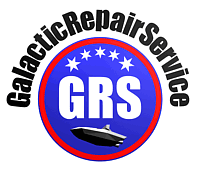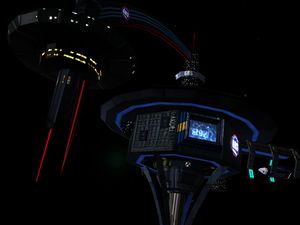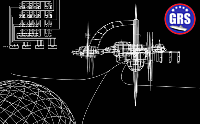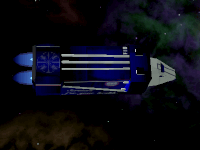Difference between revisions of "BuoyRepair"
m (rework for broken image) |
Cholmondely (talk | contribs) m (→Download: Added EM) |
||
| (44 intermediate revisions by 10 users not shown) | |||
| Line 1: | Line 1: | ||
| − | [[Image:BuoyRepair00022.png| |
+ | [[Image:BuoyRepair00022.png|200px|thumb|right|Founded in 2084004 GCT / 3135 MGMT]] |
| + | ==Introduction== |
||
| + | Trading goods between worlds is an extremely dangerous and hard job. Many trading companies lose ships through accidents, pirate ambushes and thargoid attacks. In 2084003 GCT (Galactic Coordinated Time) / 3135 MGMT (Modern Galactic Mean Time) a number of traders’ guilds decided to counteract to the increasing number of accidents by establishing the space [[Buoy (Oolite)|buoys]] as a marker for safe space lanes. |
||
| − | ===Introduction=== |
||
| + | Unfortunately individual systems are slow to replace destroyed navigation buoys left under their own jurisdiction. This can be very frustrating for pilots. For example a commander at the main station who has to meet a ship on the way to the witchpoint, will find this almost impossible when the witchpoint buoy has been destroyed. |
||
| − | Trading goods between worlds is an extremely dangerous and hard job, and most trading companies are losing ships |
||
| − | through accidents, pirate ambushes and thargoid attacks. In 2084003 GCT (Galactic Coordinated Time) / 3135 MGMT (Modern Galactic Mean Time) a number of traders’ guilds decided to counteract to the increasing number of accidents by establishing the space buoys as a marker for safe space lanes. |
||
| − | But systems are always slow in replacing destroyed navigation buoys. It is very frustrating when you are at |
||
| + | The authors of the GRS BuoyRepair OXP (Cmdrs. Walch and Svengali) investigated the causes behind the slow replacement of bouys and found a systemwide shortage. Bringing in a new buoy from far away and installing it took so much time that in most cases the pilot reporting the destroyed bouy was already in another system when its replacement arrived. |
||
| − | the main station and have to meet a ship on the way to the witchpoint when the witchpoint buoy is destroyed. |
||
| − | It is almost impossible to orient yourself in this situation. The authors (Cmdrs. Walch and Svengali) found |
||
| − | this very annoying and made a little investigation of the reasons. The main reason seemed to be a systemwide |
||
| − | shortage of buoys, so it always took much time to bring in a new buoy from far away and install it. |
||
| − | In most cases the pilot was already in an other system when the replacement arrived. |
||
| + | ==Buoy Factories== |
||
| + | [[Image:BuoyRepair00008.jpg|thumb|right|[[Buoy Repair Facility]]]]Walch and Svengali found that Industrial systems with a medium tech level were prepared to build buoys for a reasonable price. Low tech level systems didn’t have the skills to build the buoys, while high tech level systems considered the work to be beneath them. The availability of metal ore in the system was also a factor in selecting suitable production sites. Alloys for the construction of the buoys had to be readily available in the system. The buoys themselves are not strong enough to lift off a planet’s surface, so they have to be assembled in space. |
||
| − | ===Buoy Factories=== |
||
| + | Cmdr. Svengali designed a factory assembly station for assembling the buoys. Parts are pre-fabricated on the planet surface and are then flown to the assembly station in shuttles. These factories are in a constant need of alloys and will also buy alloys flown in from other systems. |
||
| − | [[Image:BuoyRepair00008.png|thumb|right|GRS Facility]] |
||
| − | Both authors looked for systems that were prepared to build buoys for a reasonable price. |
||
| − | These were found with industrial systems with a medium technical level. Systems of low technical level didn’t have |
||
| − | the skills to build the buoys and those of high level found it to inferior work to do. Another selection criterium was |
||
| − | the availability of metal ore on the planet so alloys could be extracted from it. The buoys themselves are not strong enough |
||
| − | to lift off a planet’s surface, so they have to be assembled in space. |
||
| − | Cmdr. Svengali designed a whole assembly station for this purpose. Parts for the buoys are pre-fabricated on the planet |
||
| + | The assembly stations have technologically advanced docking bay sealing: A force-field that keeps the air inside while allowing ships to pass trough. This makes it possible to load or unload ships with normal clothing instead of using pressurised suits. The disadvantage to this form of docking is that approaching pilots have no clear view of the landing bay and have to use special guiding technology to find the right flight path. Vehicles equipped with a docking computer are able to lock onto the assembly station's guidance beacon in the same way they would with any orbital docking station. |
||
| − | surface and then flown in to the assembly station with shuttles. Those factories are in a constant need of alloys and will |
||
| − | also buy alloys flown in from other systems. |
||
| − | The assembly stations have a technologically advanced docking bay sealing: A force-field that keeps the air inside and |
||
| + | ==Buoy Transport vehicles== |
||
| − | still allows for a ship to pass trough. This makes it possible to load / unload ships with normal clothing instead of using |
||
| − | pressurised suits. The disadvantage is that an approaching pilot has no visible view of the landing bay and has to use special |
||
| − | guiding technology to find the right flight path (or use his docking computer). |
||
| − | |||
| − | ===Buoy Transport vehicles=== |
||
[[Image:BuoyRepair00012.png|thumb|right|GRS Buoy Tug-Ship Armadillo]] |
[[Image:BuoyRepair00012.png|thumb|right|GRS Buoy Tug-Ship Armadillo]] |
||
| − | Buoys are of the size of a medium ship like a Cobra. This means they don’t fit in the cargo bay of a normal ship. |
||
| + | Buoys are approximately the same size as a medium ship like a Cobra. This means they won’t fit in the cargo bay of most normal ships. Walch and Svengali realised a specialised spaceship carrier would be required to transport them. A craft large enough to carry the bouys in a hold was rejected as too expensive, with the authors opting instead for the lower-cost solution of towing the buoys. Cmdr. Svengali designed the [[Armadillo]] for this role: a powerful tugship capable of delivering the buoys to their positions at a reasonable speed. |
||
| − | It would need a spaceship carrier to transport them. This was rejected as too expensive, so we choose for the lower-cost |
||
| − | solution of towing the buoys. For this job Cmdr. Svengali designed a powerful tugship that is capable of delivering |
||
| − | the cargo at a reasonable speed. |
||
| − | + | ==Distribution System== |
|
[[Image:BuoyRepair00015.png|thumb|right|GRS Distribution System]] |
[[Image:BuoyRepair00015.png|thumb|right|GRS Distribution System]] |
||
| − | Meanwhile Cmdr. Walch built a distribution system to send newly-assembled buoys from the factory to other systems |
||
| + | In order to speed the process of delivering replacement bouys on demand, Cmdr. Walch designed the GRS Distribution System to send newly-assembled buoys from the factory to other systems before they are actually needed. Once docked in another system, the replacement buoys are safely stored in the main stations. This means that when a buoy gets destroyed, a new one can be brought into place from a nearby store, arriving much more quickly than a replacement brought from another system would. |
||
| − | before they are actually needed. Once docked in another system, the replacement buoys are stored in a safe place |
||
| − | in the main stations. Now, when a buoy gets destroyed, a new one can be brought into place without much delay. |
||
| − | + | If the main station buoy needs to be replaced, a new one can be retrieved directly from the station in almost no time. If a witchpoint beacon is destroyed a new one can be quickly brought in by hyperspace by a tug jumping in with a buoy from an adjacent system. |
|
| − | a witchpoint beacon is destroyed a new one will be brought in by hyperspace jumping with a buoy from an adjacent system. |
||
| − | + | ==Large Traders and fuel ships== |
|
[[Image:BuoyRepair00021.png|thumb|right|GRS Fuel-Ship Guanako]] |
[[Image:BuoyRepair00021.png|thumb|right|GRS Fuel-Ship Guanako]] |
||
| − | + | Each GRS station has facilities to accommodate large traders that are too big to dock at a regular station. These large ships can dock at one of the two external docking bays, passing goods on to normal sized trader vessels which can deliver goods directly to the local main station or to a station in an adjacent system. GRS has also built some large fuel ships which scoop plasma from nearby stars, transform it into quirium and deliver this fuel to the GRS station. In this way each GRS station can also be used as a refuelling stop by any visiting trader. |
|
| + | |||
| + | ==Ships== |
||
| + | {| cellspacing="3" align="center" border="0" text-align="center" |
||
| + | | align="center" width="200" height="175"|[[Image:Arma.png |link= Armadillo |100px|]]<br>[[Armadillo]] |
||
| + | | align="center" width="200" height="175"|[[Image:Controller.png|link= Controller |100px|]]<br>[[Controller]] |
||
| + | | align="center" width="200" height="175"|[[Image:Guan.png |link= Guanako |100px|]]<br>[[Guanako]] |
||
| + | |} |
||
| + | |||
| + | ==Installation== |
||
| + | Download the file "buoyRepair1.3.2.oxp" and put it in Oolite’s AddOns folder. After a restart the new factories are in place and the distribution of the replacement buoys will start. Now, when a buoy gets damaged, a replacement sequence is started within 2 minutes. Sometimes replacement takes longer when traffic around stations is too busy. This is dependent on the local station manager’s ability to schedule dockings and launches. |
||
| − | ===Installation=== |
||
| + | ==Version requirement== |
||
| − | Take the file "buoyRepair1.02.2.oxp" and put it in Oolite’s AddOns folder. After a restart the new factories are in place and the distribution of the replacement buoys will start. Now, when a buoy gets defect, a replacement sequence is started within 2 minutes. Sometimes replacement takes longer when traffic around stations is too busy, but this is dependent on the local station manager’s ability to schedule dockings and launches. |
||
| + | {{OXPConfig-small}} |
||
| + | * The latest version of this [[OXP]] '''needs''' Oolite 1.75.1 (or higher) to work. |
||
| + | * It is compatible with [[OXPConfig|OXPConfig2]]. |
||
| + | * No dependencies, but if [[Transports]] or [[Aquatics]] is installed, some ships will be used. |
||
| − | ===Version requirement=== |
||
| + | ==Download== |
||
| − | <!-- [[Image:OXPConfig_compatible.png|right|50px]] --> |
||
| + | * Downloadable through the in-game [[Expansions Manager]] |
||
| − | [[Image:OXPConfig_compatible80px.png|right|50px]] |
||
| + | * [https://app.box.com/s/fe5elqh1kzndzs19v81s0qwrd6dk5ne6 buoyRepair1.3.4.zip] (5.0 MB) |
||
| − | The latest version of this [[OXP]] '''needs''' Oolite 1.72 or higher to work and is compatible to [[OXPConfig]]. |
||
| + | * Mirror -> [https://www.dropbox.com/s/utc5z98j64n87mw/buoyRepair1.3.2.zip buoyRepair1.3.2.zip] (4.5 MB) |
||
| + | <br> |
||
| + | [[Image:BuoyRepair00019.png|center|Slogan]] |
||
| − | == |
+ | ==Quick Facts== |
| − | + | {{OXPLevel|0}}{{Infobox OXPb| title = BuoyRepair |
|
| − | [[ |
+ | |image = [[Image:BuoyRepair00022.png|220px|Founded in 2084004 GCT / 3136 MGMT]] |
| − | + | |version = 1.3.4 |
|
| − | + | |release = 2015-06-24 |
|
| + | |license = (C)2008-2012 |
||
| + | |features = [[Buoy Repair Facility]],<br>[[Armadillo]], [[Controller]], [[Guanako]] |
||
| + | |category = Ambience OXPs |
||
| + | |author = [[User:Eric Walch|Eric Walch]] & [[User:Svengali|Svengali]] |
||
| + | |download = [[#Download|See Download]] |
||
| + | |feedback = [http://aegidian.org/bb/viewtopic.php?f=4&t=4567 BB-Link] |
||
| + | }} |
||
| − | [[Category:OXPConfig-compatible OXPs]] |
+ | [[Category:OXPConfig-compatible OXPs]] |
| + | {{ship-OXP}}{{station-OXP}}{{ambience-OXP}} |
||
Latest revision as of 13:35, 15 April 2021
Contents
Introduction
Trading goods between worlds is an extremely dangerous and hard job. Many trading companies lose ships through accidents, pirate ambushes and thargoid attacks. In 2084003 GCT (Galactic Coordinated Time) / 3135 MGMT (Modern Galactic Mean Time) a number of traders’ guilds decided to counteract to the increasing number of accidents by establishing the space buoys as a marker for safe space lanes.
Unfortunately individual systems are slow to replace destroyed navigation buoys left under their own jurisdiction. This can be very frustrating for pilots. For example a commander at the main station who has to meet a ship on the way to the witchpoint, will find this almost impossible when the witchpoint buoy has been destroyed.
The authors of the GRS BuoyRepair OXP (Cmdrs. Walch and Svengali) investigated the causes behind the slow replacement of bouys and found a systemwide shortage. Bringing in a new buoy from far away and installing it took so much time that in most cases the pilot reporting the destroyed bouy was already in another system when its replacement arrived.
Buoy Factories
Walch and Svengali found that Industrial systems with a medium tech level were prepared to build buoys for a reasonable price. Low tech level systems didn’t have the skills to build the buoys, while high tech level systems considered the work to be beneath them. The availability of metal ore in the system was also a factor in selecting suitable production sites. Alloys for the construction of the buoys had to be readily available in the system. The buoys themselves are not strong enough to lift off a planet’s surface, so they have to be assembled in space.
Cmdr. Svengali designed a factory assembly station for assembling the buoys. Parts are pre-fabricated on the planet surface and are then flown to the assembly station in shuttles. These factories are in a constant need of alloys and will also buy alloys flown in from other systems.
The assembly stations have technologically advanced docking bay sealing: A force-field that keeps the air inside while allowing ships to pass trough. This makes it possible to load or unload ships with normal clothing instead of using pressurised suits. The disadvantage to this form of docking is that approaching pilots have no clear view of the landing bay and have to use special guiding technology to find the right flight path. Vehicles equipped with a docking computer are able to lock onto the assembly station's guidance beacon in the same way they would with any orbital docking station.
Buoy Transport vehicles
Buoys are approximately the same size as a medium ship like a Cobra. This means they won’t fit in the cargo bay of most normal ships. Walch and Svengali realised a specialised spaceship carrier would be required to transport them. A craft large enough to carry the bouys in a hold was rejected as too expensive, with the authors opting instead for the lower-cost solution of towing the buoys. Cmdr. Svengali designed the Armadillo for this role: a powerful tugship capable of delivering the buoys to their positions at a reasonable speed.
Distribution System
In order to speed the process of delivering replacement bouys on demand, Cmdr. Walch designed the GRS Distribution System to send newly-assembled buoys from the factory to other systems before they are actually needed. Once docked in another system, the replacement buoys are safely stored in the main stations. This means that when a buoy gets destroyed, a new one can be brought into place from a nearby store, arriving much more quickly than a replacement brought from another system would.
If the main station buoy needs to be replaced, a new one can be retrieved directly from the station in almost no time. If a witchpoint beacon is destroyed a new one can be quickly brought in by hyperspace by a tug jumping in with a buoy from an adjacent system.
Large Traders and fuel ships
Each GRS station has facilities to accommodate large traders that are too big to dock at a regular station. These large ships can dock at one of the two external docking bays, passing goods on to normal sized trader vessels which can deliver goods directly to the local main station or to a station in an adjacent system. GRS has also built some large fuel ships which scoop plasma from nearby stars, transform it into quirium and deliver this fuel to the GRS station. In this way each GRS station can also be used as a refuelling stop by any visiting trader.
Ships
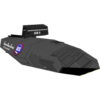 Armadillo |
 Controller |
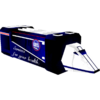 Guanako |
Installation
Download the file "buoyRepair1.3.2.oxp" and put it in Oolite’s AddOns folder. After a restart the new factories are in place and the distribution of the replacement buoys will start. Now, when a buoy gets damaged, a replacement sequence is started within 2 minutes. Sometimes replacement takes longer when traffic around stations is too busy. This is dependent on the local station manager’s ability to schedule dockings and launches.
Version requirement
- The latest version of this OXP needs Oolite 1.75.1 (or higher) to work.
- It is compatible with OXPConfig2.
- No dependencies, but if Transports or Aquatics is installed, some ships will be used.
Download
- Downloadable through the in-game Expansions Manager
- buoyRepair1.3.4.zip (5.0 MB)
- Mirror -> buoyRepair1.3.2.zip (4.5 MB)
Quick Facts
| Version | Released | License | Features | Category | Author(s) | Feedback |
|---|---|---|---|---|---|---|
| 1.3.4 | 2015-06-24 | (C)2008-2012 | Buoy Repair Facility, Armadillo, Controller, Guanako |
Ambience OXPs | Eric Walch & Svengali | BB-Link |
